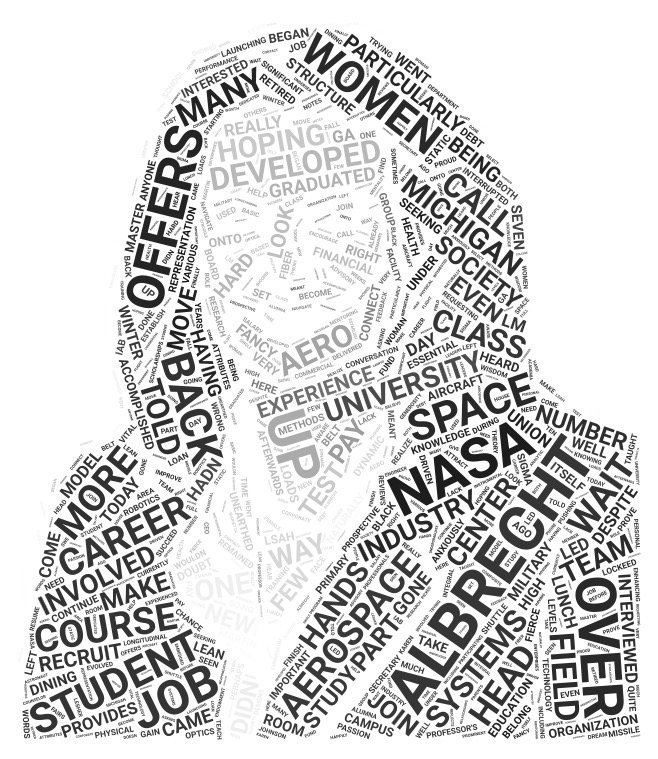
Albrecht on overcoming obstacles, hands-on experience, and why she gives back to Aero
A conversation with accomplished alumnus, Karen Albrecht

A conversation with accomplished alumnus, Karen Albrecht
It was the Fall of 1972. NASA Johnson Space Center came to campus hoping to recruit a significant number of engineers, particularly seeking female aerospace leaders who may be interested in working at NASA. Naturally, they called the Society of Women Engineers at the University of Michigan (SWE) hoping to connect with prospective recruits. Karen Albrecht was head of the society at the time, and she picked up the phone. She was the only member graduating that winter.
She was interviewed over lunch. Albrecht remembers going into the Michigan Union’s fancy dining room afterwards to continue the conversation, which she thought at the time went really well. However, when weeks had gone by and she hadn’t heard back, she began to doubt. As she fielded seven job offers, she was anxiously waiting to hear back from NASA before making a decision.
Finally, one day the department secretary interrupted a professor’s class, requesting that Karen come take NASA’s phone call. She was told they unearthed her resume and it was on its way into the right hands in the organization. From there, she was offered her dream job to join NASA. It was worth the wait.
At NASA Johnson Space Center, Albrecht developed analytic methods for composite primary structure under static and dynamic loads for the Space Shuttle. She was part of the test group who helped establish physical attributes to select women to become astronauts, which led to her involvement in the Longitudinal Study of Astronaut Health (LSAH). She then moved onto Lockeed Martin, where she worked on Missile Launching Systems, Basic Research, Commercial Aircraft, Undersea Systems, SMART Structures, Robotics and high-performance Military Aircraft. She developed embedded fiber optics technology and is a Master Black Belt in 6-sigma and Lean Engineering. She retired as head of engineering at the LM facility in Marietta, GA.
But before accomplishing all that, Albrecht was the only female student in her class at U-M. She even remained the only woman in the department for a few years. She had a fierce determination to prove anyone who didn’t believe in her wrong– and sometimes, that meant the university itself. Despite being told by many people at various levels in the university, including her counselor, that she didn’t belong here and wouldn’t succeed, she did.
Despite this (or perhaps, in part, because of it), Albrecht worked very hard during school and graduated in 3.5 years. Her favorite experience as a student was the flight test course taught by Professor Lesher, where she got the chance to fly over her parents house in Flint. This course helped her realize why she was doing all that work: it showed her what could be accomplished.
Today, Albrecht is quite involved with the university. She’s been integral in the new model-based systems engineering courses, which she’s been pushing the university to teach since she joined the Industrial Advisory Board (IAB), over 20 years ago. Her longstanding role is driven by a passion for enhancing the Aerospace curriculum with industry-perspective training.
Albrecht is currently the CEO of Karen Albrecht Enterprises, a Career and Personal Development Organization. She has delivered over 200 seminars for courses she developed and happily gives her time and knowledge to students looking to navigate career fairs and improve their resumes. She has also set up an endowment fund for Aerospace undergraduate education and provides scholarships for Aerospace Engineering students at the University of Michigan who need the support to finish their education. Her generosity has already helped more than ten Aero students pay for their studies.
Karen has seen and experienced the financial struggle that many students face. “I left college with a college loan greater than my starting salary. As my career evolved I was able to move from mentoring students to supporting them financially. You can find ways to give back to help others even when you have to pay off college debt,” she reflects.
Albrecht also has a few words of wisdom to Aerospace students today. She says, “I encourage every Aero student to get on a team to gain hands-on experience. Having a team-based mentality is vital because working as an engineer is not just about the theory or the experiments, it’s about both, and participating on a team offers that.”
Knowing that these years are full of hard work and important relationships, she also offers,
“Make the most of the incredible classes at U-M– in my career I used knowledge from every single one.”
Much of Albrecht’s career has been dedicated to trying to get more women involved in the aerospace industry. She recognizes that aero doesn’t attract as many women because of the military weaponization of the field and lack of female representation in that area. However, being aware of the importance of female representation as leaders and engineers in academia and corporate work is essential. “There’s more work to be done,” she notes, but having prominent alumna that people– particularly, women– can look up to is essential. Albrecht is proud to have had students contact her, asking for help with resumes and job applications.